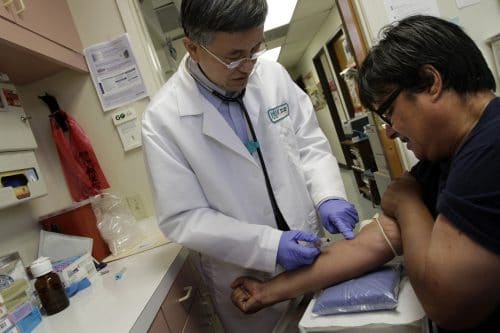Universal Health Coverage? Not Without Primary Health Care
COMMENTARY

With COVID-19 public health measures largely in the rearview mirror, many countries are refocusing on pre-pandemic commitments to achieve universal health coverage by 2030. This health-for-all goal is founded on equity and the right for everyone to access the services they need, when they need them and without financial hardship.
Primary health care is the “expressway” to achieving UHC. It meets 80%-90% of lifetime health care needs and is associated with better health outcomes, improved equity, increased health security and better cost-efficiency. PHC encompasses routine care from empaneled health care teams, public health functions, including first-line disease surveillance and reporting, contact tracing and vaccination campaigns, and an outreach function through community health workers that can engage in health promotion, disease prevention, early screening, home-based care and much more. The critical role of PHC in advancing health equity was encoded in the Alma-Ata Declaration of 1978 and re-affirmed in the 2018 Astana Declaration.
Despite strong declarations and global commitments, PHC remains underfunded and underutilized with nearly half of the world’s population not having access to essential health services and 100 million going into poverty due to health care expenses. There are several reasons for this — allocations of national health funds may be more weighted to tertiary or secondary care, and overall allocations from national coffers in health funds.
PHC is a three-in-one investment, enabling not only UHC but also health security and better health and well-being. At PATH, we support breaking down long-existing disease or health area funding siloes, and focusing instead on integrated services and systems that encompass a lifecycle approach. The aim is for greater investment in country-defined plans for PHC and health systems overall to enable increased coverage, sustainability and resiliency over the long term.
Demand on PHC workforce and systems during the COVID-19 pandemic clearly reinforced the importance of resilience, and we worked with countries to enable a strong and tailored pandemic response. The pandemic laid bare the overwhelming impact that under-funded or under-resourced heath systems can have on population health and ultimately on life expectancy. The importance of having strong, responsive and trusted health services and systems in place in times of calm cannot be overstated.
Three critical elements to resiliency of PHC that emerged during COVID-19 are stronger digitalization of health systems, increased access to self-care approaches and technologies, and purposive social engagement to foster stronger trust. Digital transformation enables multi-level strengthening of PHC such as through electronic decision support tools and longitudinal case management, generation of data for decision making and quality improvement, and offering greater precision with resource planning, staff deployment and supply chain management.
Self-care is, in essence, about an individual’s agency over their body and health. It translates into people having access to the information and tools they need to determine how best to manage their health. Strengthening self-care options complements services needed from health professionals, and can serve to relieve pressure on health facilities, so they can focus on maintaining essential services.Strong social engagement means true partnership with communities where they are able to co-design, monitor and keep leaders accountable for commitments to quality and affordable PHC.
We know that PHC is the most cost-effective, inclusive and impactful means to achieve health for all. For UHC by 2023 to become a reality, we must keep PHC at the top of global, national and subnational agendas, and work to address broader determinants of health.
To achieve UHC, PHC must be inclusive, welcoming and equipped to reflect the needs of all people. The late Paul Farmer said, “If access to health care is considered a human right, who is considered human enough to have that right?” His words ring true today — access for some is not sufficient. We must demand access for all.
Kimberly Green, Ph.D., leads PATH’s Primary Health Care program, which includes teams focusing on health systems and health areas across the life cycle. Green has more than 30 years of experience in public health management, policy development and research. Before joining PATH, she directed and supported several global and regional primary health care projects in Africa and Asia, partnering with ministries of health, communities and the private sector to incubate and scale up evidence-based approaches. Green is a clinical associate professor in the University of Washington’s Department of Global Health and deputy editor for the Journal of the International AIDS Society. She also serves on a number of World Health Organization and other scientific guideline and advisory committees. You can reach the Global Self-Care Federation on LinkedIn and Twitter.

























